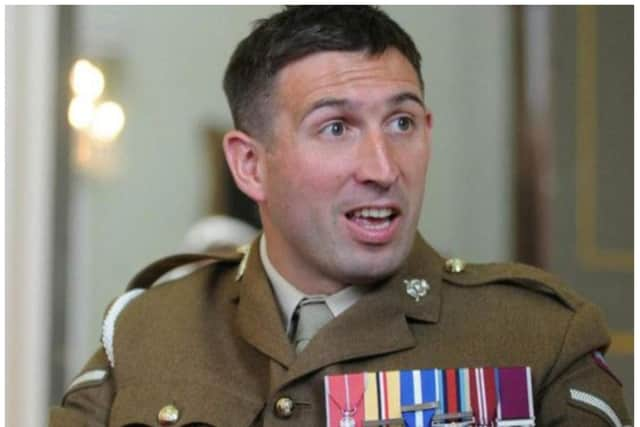Calls for investigation into Doncaster war hero Ben Parkinson's medical treatment
and live on Freeview channel 276
Former army major and fellow Afghanistan veteran Dan Jarvis MP wants answers over the treatment Ben has received over the last 16 years since he lost both his legs and suffered devastating injuries in a bomb attack.
The most severely injured soldier to survive the war in Afghanistan, in 2006, the land rover he was travelling in hit a landmine with Ben also suffering a broken back, and lasting brain damage.
Advertisement
Hide AdAdvertisement
Hide AdA new Sunday Times investigation has uncovered the full details of his emergency treatment in Afghanistan and raised serious concerns about the preparedness of the Ministry of Defence (MoD).


Shockingly, since his return to civilian life, Parkinson’s family and charities have had to cover a significant amount of his medical treatment expenses, with an MoD fund only covering roughly half the cost of his care.
Mr Jarvis, who has long-known Ben and the Parkinson family, has called for the Ministry of Defence to do right by Ben and urgently review his case.
He said: “Ben Parkinson is a hero who’s sacrificed everything for our country.
Advertisement
Hide AdAdvertisement
Hide Ad“It is beyond shameful that he and his family have had to fight — every step of the way — to secure the treatment he both needs and deserves.
“It’s just not right that having been so badly injured the MoD don’t cover the full costs of his care. It’s completely unacceptable that he has to rely on the goodwill of charity and the generosity of family.
“It’s also particularly frustrating that the MoD have been so difficult to deal with. The saga of getting sight of Ben’s X-rays reflects very poorly.
"They should have been moving heaven and earth to do the right thing, and support Ben and his family, instead they seem to have lost sight of the duty of care they have to our most seriously wounded soldier.
Advertisement
Hide AdAdvertisement
Hide Ad“Given the entirely understandable concerns expressed by Ben’s family it’s only right that Ministers now review the detail of Ben’s circumstances to ascertain whether the military covenant has been breached and if so, what they’re going to do to put things right. That’s the least Ben deserves after everything he’s done for our country.”
In the investigation by the newspaper, Ben’s mum Diane Dernie said: “We were fighting a war without a proper hospital in place with the right equipment.”
“We send our sons and daughters to war, and if something bad happens, we expect them to get the very best medical treatment available. I think it’s important the public finally know the truth about what happened to him.”
In the aftermath of the explosion, a small band of British soldiers risked their lives to run through a possible minefield to Parkinson’s side. One was Corporal Matty Oliver, a trauma medic attached to the patrol. Oliver got Parkinson breathing again by carrying out an emergency “crike” — slang for surgical cricothyroidotomy — cutting through the throat to open the airway and insert a tube.
Advertisement
Hide AdAdvertisement
Hide AdParkinson desperately needed blood, and a Mert (medical emergency response team) was on its way from Camp Bastion. But in 2006 Merts carried no blood on their helicopters.
A letter, written in May 2015 in response to the family’s complaint about Ben’s treatment, outlined the limitations of treatment at the field hospital at Camp Bastion at the time, describing “finite quantities of blood” and “rudimentary” radiology with no CT scanner. “There was effectively one surgical team, comprising a general surgeon, orthopaedic surgeon, and two anaesthetists,” the letter said. “The absence of a CT scanner meant that brain injury could not be imaged.”
Parkinson’s mother said: “He was treated in a tent — similar to what you see in M*A*S*H [the long-running US series set in the Korean War].”
She said: “We were at war and British soldiers were being blown up and shot at,” Dernie said. “Many soldiers had already died. So why didn’t the medical team at Bastion have what they needed? Why were their resources so limited?”
Advertisement
Hide AdAdvertisement
Hide AdStepdad Andy Dernie said: “His care needs should be fully funded. We shouldn’t have to be waiting three years to get gym equipment or wheelchairs from various charities. We have to fight like hell to get anything for him.”
An MoD spokesman said: “Lance Bombardier Parkinson made enormous sacrifices for this country and we thank him for his invaluable service.
“We are determined to provide the best possible support to all personnel who have been injured during their service. In 2019, we agreed a support package for Lance Bombardier Parkinson to ensure he received comprehensive care as he transitioned to civilian life.”